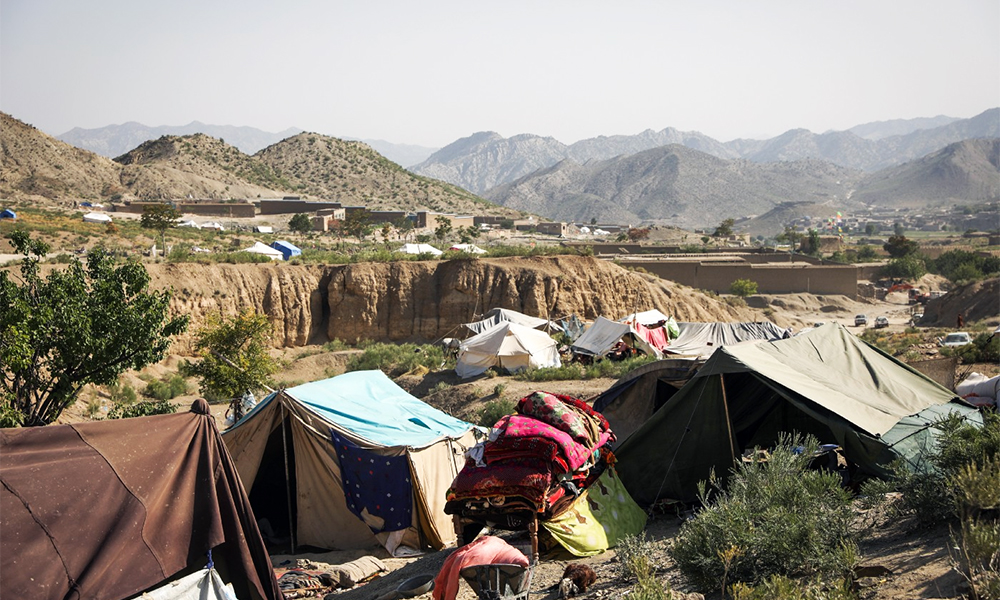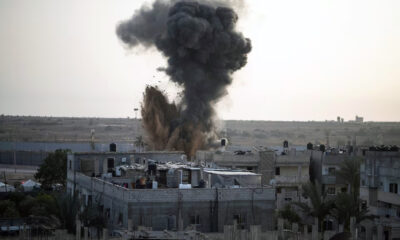Latest News
IOM helps Paktika rise from the rubble after deadly earthquake

Thousands of Afghans in Paktika province say they face an uncertain future and have no idea how their communities will rebuild their lives after last month’s deadly earthquake that killed over 1,000 people and destroyed an estimated 10,000 homes.
In the early hours of June 22, a 6.1 magnitude earthquake struck the remote, mountainous region and while concerted efforts are being made by aid workers to help the survivors, their efforts are being hampered by the mountainous terrain and heavy rains.
IOM reported this week that the humanitarian community has mobilized funds and personnel for the response and that IOM teams were on the ground in the affected area following the earthquake, weathering aftershocks alongside the affected community.
Humanitarian actors are busy, the IOM reported and workers are meeting with community members to assess their needs, organizing the first emergency distributions and setting up tents, latrines and hand washing stations.
Trucks loaded with a variety of kits are also arriving in waves, having successfully navigated the remote mountains, riverbeds and roads that make the area particularly difficult to access.
Thousands of people are trying to get the basic items they need for immediate survival — food, water, health care and shelter.
“I was in my house asleep when it started shaking,” says Krushnal, a survivor from Barmal, still living with his four children on the site of their collapsed house.
“A piece of wall hit me, but I am not seriously injured. I saw bodies being pulled out of the rubble, injured people, and maybe dead people. I heard cries of pain everywhere I went,” he told IOM.
The majority of the fragile mud-brick houses in the area did not withstand the earthquake. While many currently lack the means to rebuild much of their community, the survivors have come together alongside humanitarian actors to plan for the recovery of the community.
A few kilometers from Gayan, IOM Mental Health and Psychosocial Support (MHPSS) staff hold counseling sessions with victims amidst the rubble. Three distinct groups are formed for the sessions: women, men and children.
Mobile clinics have also been operating in this mountainous area, which is located far from health centers. In addition, community members have identified psychological support as a key need, which has been included in the IOM earthquake response from the first day.
IOM reports that as of July 8, 140 trucks have successfully reached the impacted areas of Paktika and Khost provinces and some 30,000 emergency shelter and non-food item kits have been distributed to 5,600 families in need.
But now, according to the IOM, the focus has switched to post-disaster longer-term rebuilding of houses, and of lives.
IOM and other shelter actors are working together to support the communities to clear the rubble of the damaged homes and to build back their homes safely.
However, other public infrastructures will also need to be rehabilitated to ensure communities can return to normal. Water sources that have been contaminated must be treated and fixed to ensure access to safe and clean water again.
According to the IOM, repurposing of existing emergency funding enabled IOM to undertake a swift, immediate response to provide life-saving assistance to affected communities but now, longer-term funding from both humanitarian and development actors must be committed and made available immediately to ensure that houses and essential community infrastructure can be rebuilt before the harsh winter arrives in November.
Latest News
Afghanistan’s problems caused more damage to Pakistan than 3 wars with India: Durrani

Islamabad’s special envoy for Afghanistan Asif Durrani said on Wednesday that Pakistan has suffered more due to Afghanistan’s internal situation than Pakistan has suffered in three wars with India in terms of blood spilt and finances drained.
Durrani said at a one-day International Conference titled “Pakistan in the Emerging Geopolitical Landscape”, which was organized by the Institute of Strategic Studies Islamabad (ISSI) and the German Friedrich Ebert Stiftung (FES), that over 80,000 Pakistanis died in the two decades of the War on Terror and that his country was still counting its dead and injured.
“After the withdrawal of NATO forces, it was hoped that peace in Afghanistan would bring peace to the region. However, such expectations were short-lived,” he said.
He also stated that attacks by the Tehreek-e-Taliban Pakistan (TTP) militant group on Pakistan’s border areas increased by 65 percent, while suicide attacks increased by 500 percent.
“The TTP’s enhanced attacks on Pakistan while using Afghan soil have been a serious concern for Pakistan. Another worrying aspect is the participation of Afghan nationals in these attacks,” he said.
Durrani also said Pakistan had suffered geopolitically since the Soviet Union invaded the neighboring country.
“The post-9/11 world order has negatively impacted Pakistan. Apart from losing 80,000 citizens’ lives, including 8,000 law enforcement agency personnel, the country’s economic opportunity cost is estimated at $150 billion,” Durrani said.
Talking about the future outlook for Pakistan in the regional context, Durrani said that while “our eastern neighbor is likely to continue with its anti-Pakistan pursuits, the western border poses an avoidable irritant in the short to medium term.”
However, he said Pakistan can overcome its difficulties with Afghanistan, including the TTP challenge.
Latest News
Afghanistan now a ‘nexus for diplomatic endeavors’, says IEA

In the wake of dozens of meetings between high-ranking Islamic Emirate officials and visiting officials from foreign countries, and other diplomatic advances, the IEA said on Thursday that in the current geopolitical landscape, Kabul now “serves as a nexus for diplomatic endeavors and political deliberations pertaining to global affairs”.
In a series of posts on X, the IEA’s spokesman Zabihullah Mujahid said diplomatic missions and political delegations from various nations, including Russia, Malaysia, Kazakhstan, Turkmenistan, the European Union, and others, “are evident in the capital, highlighting its strategic importance in fostering Islamic cooperation”.
He said: “Recently, the honorable Minister of Transport of the Islamic Emirate, Mr. Hamidullah Akhundzada, led a significant delegation to Termez, Uzbekistan, for essential discussions aimed at enhancing bilateral relations.
“These discussions encompass a wide range of topics, from trade facilitation to security assurances, indicating a focused effort by the Islamic Emirate to strengthen and broaden its international engagements, thereby ensuring sustained development and stability.
“These initiatives, characterized by diligence and effectiveness, underscore Afghanistan’s enduring commitment to diplomatic engagement and its pivotal role in regional and global affairs,” he said.
Mujahid added that these initiatives “also emphasize the vital connection between diplomatic efforts and economic prosperity, promising favorable outcomes for Afghanistan’s socio-economic landscape.”
He pointed out that despite ongoing challenges, Afghanistan “remains steadfast in its pursuit of prosperity and resilience, defying pessimistic projections and charting a course towards political and economic renewal.”
He said: “Continued efforts are essential to fostering inclusive growth and impactful initiatives, thus advancing Afghanistan’s journey towards sustainable development and increased influence on the global stage.”
Latest News
Mullah Baradar discusses creation of railway with Kazakh deputy PM

Mullah Abdul Ghani Baradar, deputy prime minister for economic affairs has met with Erik Zhumangarin, the Deputy Prime Minister of Kazakhstan, and discussed the establishment of a railway network from Kazakhstan to Pakistan through Turkmenistan and Afghanistan, the deputy PM’s office said in a statement.
During the meeting, Baradar emphasized the need to sign agreements to solve the banking problems of traders from both countries, the creation of Afghan-Kazakh joint companies, and the facilitation of visas for Afghan traders.
According to the statement, the Deputy Prime Minister of Kazakhstan said that the Kazakh government intends to establish a joint chamber of industry and commerce and a joint trade and labor group between the two countries, and is ready to cooperate with Afghanistan in the sectors of e-governance, industry, higher education, education, health, and banking.
-

 Sport5 days ago
Sport5 days agoAfghanistan Champions League kicks off with grand opening ceremony
-

 Latest News4 days ago
Latest News4 days agoPakistan’s frontiers minister stresses ‘dignified’ return of Afghan refugees
-

 Latest News5 days ago
Latest News5 days agoMore than 800 Afghan refugees deported from Pakistan in two days
-

 Regional3 days ago
Regional3 days agoIranian president lands in Pakistan for three-day visit to mend ties
-

 Climate Change4 days ago
Climate Change4 days agoMassive river flooding expected in China, threatening millions
-

 Latest News4 days ago
Latest News4 days agoChinese keen to invest in Panjshir-Kabul water conduit project
-

 World4 days ago
World4 days agoTwo Japan navy helicopters crash, one body found, 7 missing
-

 Latest News2 days ago
Latest News2 days agoRashid Khan named AWCC’s brand ambassador
























